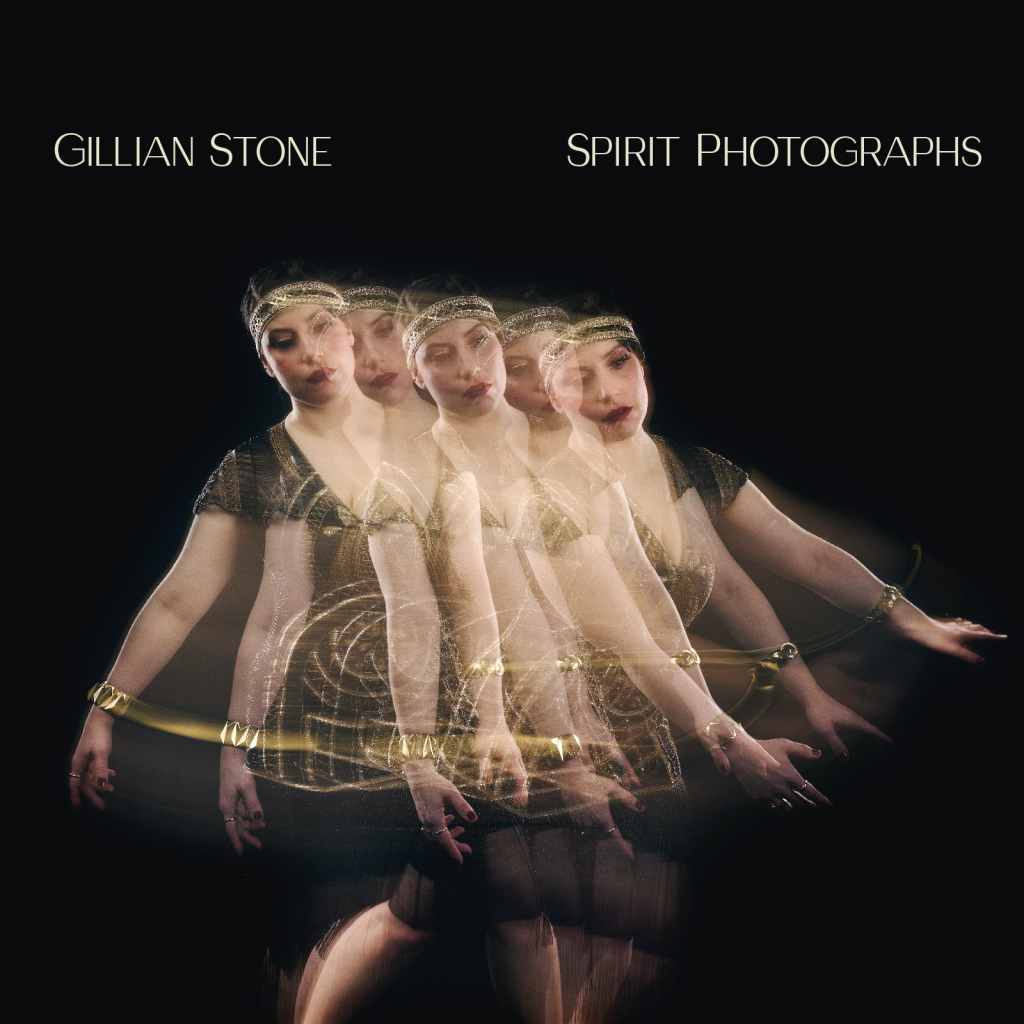GILLIAN STONE, “Spirit Photographs” (Scapes Sound, 2022)

L’articolo mensile di Monolith Cocktail è dedicato all’EP di Gillian Stone: polistrumentista e artista di Toronto, è stato pubblicato il 18 novembre con il titolo “Spirit Photographs”. Si tratta di un EP di cinque brani, ed è in vendita su Bandcamp.
Dressed like a spiritualist flapper of the 1920s on the cover of her new EP, the Toronto siren and artist Gillian Stone summons various manifestations in the pursuit of processing both grief and the debilitating effects of mental health.
Made apparent by the title, the 19th century and early 20th century phenomena of “spirit photography” lends a somewhat esoteric, supernatural and mysterious angle to what is in fact the more academic psychiatric method of dealing with, and in time, coming to terms with loss. For each song on this deeply felt, atmospheric release represents one of the five stages of Elizabeth Kübler-Ross’ pioneering model: that’s Denial, Anger, Bargaining, Depression and finally, Acceptance. The Swiss-American doyen of psychiatry, heralded in Time magazine as one of the 20th century’s “100 Most Important Thinkers’, wrote one of the leading works (On Death And Dying) on accepting the inevitable in the late 1960s, after personally witnessing such traumas and dealing with childhood illness herself – an epiphany was struck after facing the aftermath of the Second World War’s concentration camps.
More or less the standard in counseling and navigating death, Kübler-Ross’ process is merged with unscientific empirical desperation and the often charlatan practice of Spiritualism. As a practice that grew out of the infancy of photography itself, and in part from the collective grief of the American Civil War, certain practitioners using various techniques added dead family members, loved ones in apparitional form to sitting portraits – usually lurking behind the very much alive subject, or manifesting from their supposed psyche. What may have been a comfort to some – proof of life-after-death and messages from beyond the ether – was essentially a trick. However, Stone draws that which cannot be quantified, explained together with the scientific mind in an act of describing her own anxieties, pains, but eventual release from the spectre of depression. And although this is a sometimes haunting, uneasy EP, Stone’s beautifully accented prose and emotions are delivered with a lighter, diaphanous touch that exudes as much promise as sorrow. Even when covering the heavy melancholy of Black Sabbath’s morbidly curious ‘Solitude’ Stone turns a self-pitied gloom of a tune into a Pentangle (the quintessential English acid-psych-folk ensemble not the Satanic symbol) like, medieval reaching and more sweetened proposition.
Stone obviously turns the original’s pained, male-prospective on its head: with everything that entails. Mind, it’s still a trudge through the miserable, and it’s also used to represent ‘stage four” on the scale: depression. Talking though of addressing gender imbalances, Stone enters, at times, the heavily over-subscribed post-rock arena on many of the EP’s tracks. It’s a genre I’m not too impressed with personally, and find quite boring and mundane – sacrilege I know, but God I hate Mogwai and their self-indulgent turgid malaise. Stone however, brings an endearing, inviting almost, quality to that genre; especially on the gently sweeping, almost sleepwalking dreamt spell ‘June’, which opens the EP. Representing the first stage, denial, this slow drummed bohemian and quivery-droned chill is one of Stone’s most sublime turns; a kind of haunted communion of Dana Gavinski, Michael Peter Olsen, the Heartless Bastards and Aldous Harding – two of which appear on Stone’s specially created playlist of EP influences.
Working with co-producer Michael Peter Olsen (Zoom, The Hidden Cameras) and drummer Spencer Cole (Weaver, Weather Staion) Stone’s singular talents are amplified by the accentuated, careful and purposeful contributions of her foils. Especially on the two tracks already mentioned, but also on the folksy and gothic travelled tumultuous ‘Amends’ (Provincials and These Trials break bread with All About Eve as a snuggled suffused saxophone-like drone weeps), and David Sylvain mood piece ‘Raven’s Song’. The latter I’m sure has some American Gothic, Poe-like inspiration about it; after all, it is supernatural in sound with touches of creeping hymnal atmospherics and even the ominous clopping of hooves.
That’s both “anger” and “bargaining” dealt with on this journey. The final stage, turning point you could say, is of course “acceptance”, and this is reflected on the siren song ‘The Throne’. Full of “drowning” metaphors it might be, but the waters of despair also cleanse and wash away the helpless state of a mental stumbling block in the process. Hints of 70s folk-rock and country can be, intentional or not, detected on what is another beautifully conveyed plaint. I must emphasis however that Stone’s timbre, cadence and tone is far from mournful, or even helpless. Instead the abstract of dealing with such problems, illness and grief is articulated with a certain beauty (that word yet again) and spirit of perseverance and understanding. In an age, as Stone quotes, of “collective trauma” it can feel so comforting to know that others get your pain, or, in this case can transform it into something so constructive and creatively therapeutic: no matter how bleak. But unlike the parlour tricks, charade of spirit photography, Stone casts her ghostly visitations aside, finding a release and source of light in the darkness of both inner and outer torment.
(Dominic Valvona)

The Monolith Cocktail è un blog indipendente con base a Glasgow, Scotland (UK).
Le ragioni della collaborazione tra Kalporz e The Monolith Cocktail puoi leggerle qu








